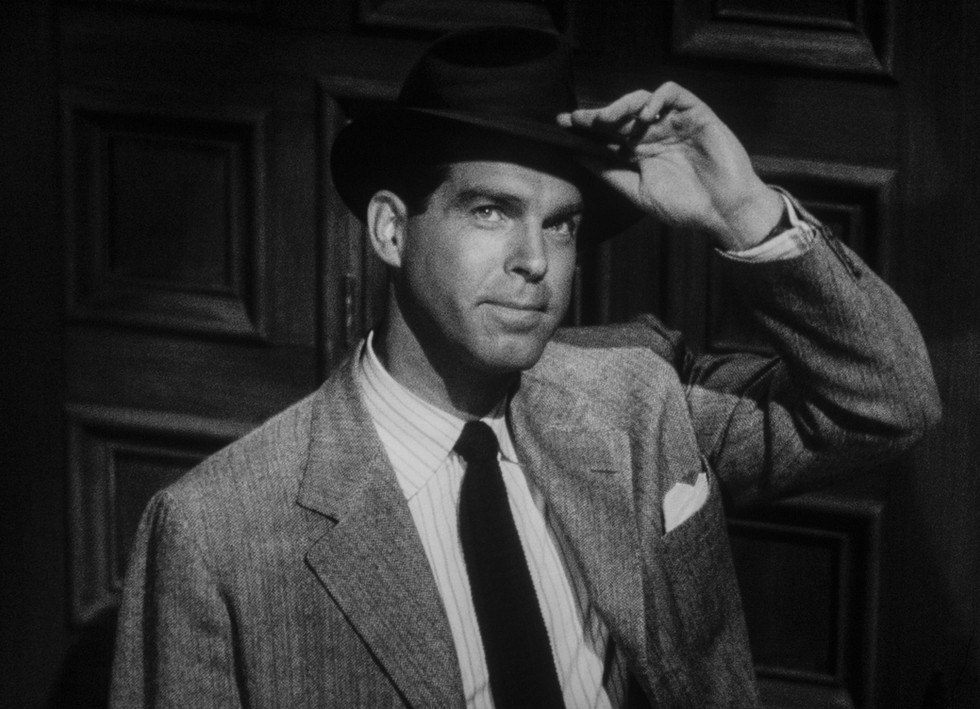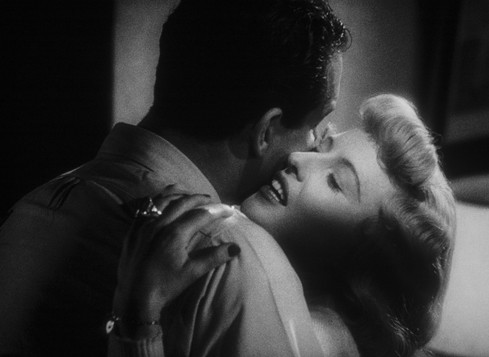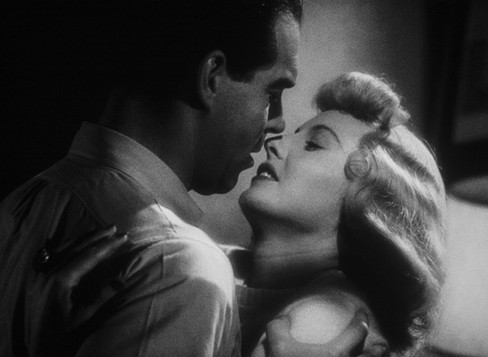Remastered in 4K UHD, Criterion’s “Double Indemnity” is one of the year’s top titles
- Craig Shapiro
- Jun 23, 2022
- 5 min read
Updated: Jul 28, 2023
4K ULTRA HD REVIEW / HDR FRAME SHOTS

Barbara Stanwyck stars as the cunning Mrs. Phyllis Dietrichson and Fred MacMurray as Walter Neff, the cocky insurance salesman who conspires to murder her husband.
(Click an image to scroll the larger versions)
“DOUBLE INDEMNITY: THE CRITERION COLLECTION”
4K Ultra HD and Blu-ray; 1944; not rated but not for children
Best extra: A new conversation between film historians Eddie Muller and Imogen Sara Smith
THERE AREN’T many givens these days, but there are exceptions. Like when Criterion turns its attention to a classic like Billy Wilder’s “Double Indemnity,” still the touchstone for American film noir nearly 80 years after it set the bar, you can bet that every stop will be pulled out. And that’s what they’ve done, with a stunning 4K UHD restoration, a remastered, uncompressed monaural soundtrack, and a solid package of new and vintage extras that are worth every minute of your time. You can count on this, too: “Double Indemnity,” which collected seven Oscar nominations, including Best Picture, Director, Screenplay (Wilder and Raymond Chandler), and Actress (Barbara Stanwyck), will finish 2022 on more than a few best-of lists. About those Oscar nods. Incredibly, it didn’t win a single statuette; instead, the voters—surprise—had a taste for saccharine, in this case Bing Crosby’s “Going My Way.” For the record, Wilder cleaned up the next year when “The Lost Weekend” won Best Picture, Director, Screenplay (Wilder and Charles Brackett), and Actor (Ray Milland).
(1) Based on the novel by James M. Cain, the film opened on April 24, 1944. (2) The injured Walter Neff records his confession, addressing his boss and friend, Barton Keyes. (3&4) Neff drops in on the Dietrichsons to follow up on an automobile insurance renewal and meets Mrs. Dietrichson when she appears on the landing wearing just a towel. (5) She doesn’t go unnoticed by the housekeeper Nettie (Betty Farrington), either. (6&7) Neff waits in the living room while Mrs. Dietrichson gets dressed. When she joins him, the sparks fly.
But back to the business at hand. Fred MacMurray, long before his days as widowed dad Steve Douglas on TV’s “My Three Sons” (1960-72), plays Walter Neff, the cocky, top salesman at Pacific All Risk Insurance Co. He’s out on a call one afternoon and decides to drop by another client’s house to talk with him about renewing his auto policy. Mr. Dietrichson (Tom Powers, “The Blue Dahlia,” 1946) isn’t home, but his wife Phyllis (Stanwyck, “Sorry, Wrong Number,” 1948, TV’s “The Big Valley,” 1969-69), is, and when Neff gets an eyeful—she’s wearing just a towel—he’s done. She asks him to return the next day. Supposedly, Mr. Dietrichson, who’s in the oil-drilling business, will be home, but he’s a no-show again. They’re drinking iced tea when she “innocently” asks if an accident policy could be taken out on her husband without him knowing it. See, he just hates the idea and would never agree. Neff, though, can read between the lines, and, ensnared in Phyllis’ web, starts plotting how to get away with murder without raising the suspicions of his boss, Barton Keyes. Edward G. Robinson (“Little Caesar,” 1931, “Key Largo,” 1948), a long-established leading man in 1944, dives into the supporting role, and is nothing short of terrific.
(1&2) When Neff arrives the next day, Phyllis asks if an accident policy can be taken out on her husband with him knowing about it. (3-5) It isn’t long before she shows up at his apartment.
Working from the 1943 novel by James M. Cain, Wilder and Chandler, who introduced the world to hardboiled private eye Philip Marlowe in his 1939 novel, “The Big Sleep,” redid the ending. It was a good call, too. Where the book’s suicide pact catches you off-guard, the movie’s final scene couldn’t play better. Apparently, Wilder and Chandler couldn’t stand each other, but that didn’t stop them from delivering line after line of pitch-perfect, rapid-fire dialogue, either.
Exhibit A: This exchange when Walter and Phyllis meet: Mr. Neff, why don’t you drop by tomorrow evening about eight-thirty. He’ll be in then.
Who?
My husband. You were anxious to talk to him weren’t you?
Yeah, I was, but I'm sort of getting over the idea, if you know what I mean.
There’s a speed limit in this state, Mr. Neff. Forty-five miles an hour.
How fast was I going, officer?
I’d say around ninety.
Suppose you get down off your motorcycle and give me a ticket.
Suppose I let you off with a warning this time.
Suppose it doesn’t take.
(1) Edward G. Robinson plays the shrewd insurance investigator Barton Keyes. (2&3) Mr. Dietrichson (Tom Powers) finally arrives home and seals his fate by signing what he thinks are documents to renew the automobile policy. (4) Neff drives Phyllis’ step-daughter Lola Dietrichson (Jean Heather) downtown to meet her boyfriend.
VIDEO/AUDIO “Double Indemnity” (1.37:1 aspect ratio) was scanned in 4K from the British Film Institute’s 35 mm nitrate composite fine-grain, with a 35 mm safety duplicate created in 1986 used to replace missing frames. Yeah, the picture goes a bit soft here and there, but the blacks are rich and deep, the contrast is razor-sharp, detail in the close-ups is exceptional (you can’t miss the sweat on Neff’s face), and the grain is so consistent that you hardly notice. HDR grading is provided by the standard HDR10 and the more advanced Dolby Vision with metadata controlling each frame and scene. Especially intoxicating is the nuanced play of shadow and light orchestrated by cinematographer John F. Seitz, who was nominated for an Oscar (and for “The Lost Weekend” and Wilder’s “Sunset Blvd.” in 1950). The shifts are so subtle that the lighting seems almost organic. The original monaural soundtrack was also remastered from the nitrate fine-grain. It handles everything from the crack of a revolver to the pop of a match against Neff’s fingernail, while still prioritizing the memorable dialogue. There’s more: The Oscar-nominated score by Miklós Rózsa (“Spellbound,” 1945, “Ben-Hur,” 1959) is as clear as an unmuddied lake. EXTRAS As advertised, everyone is worth a watch, but the conversation between Eddie Muller, who curates and hosts TCM’s “Noir Alley, and Criterion regular Imogen Sara Smith, author of “In Lonely Places: Film Noir Beyond the City,” is first-rate. They discuss the sensational murder that inspired Cain, Wilder and Chandler’s relationship, Walter and Phyllis’ motives, and “Double Indemnity’s” place in the canon. The consensus: It defined, and still defines, American noir. “Compared with ‘The Maltese Falcon’ and other early films, ‘Double Indemnity’ is much darker,” Smith says. “It seems to go much further in suggesting a kind of essential rottenness in middle-class American life.”
(1&2) The killers execute their cold-blooded plan.
The other new feature is “Words, Words, Words,” an interview with Noah Isenberg, editor of “Billy Wilder on Assignment.” Elaborating on Wilder’s formative experiences writing for newspapers in Vienna and especially in Weimar Berlin, Isenberg says he “was American before he was American.” With the Nazis taking power, Wilder left Berlin and arrived in Hollywood in 1934, where he took advantage of the opportunity to reinvent himself, Isenberg adds. He was naturalized in 1940. Other extras in the three-disc set include an engrossing commentary recorded in 2014 by the late critic/historian Richard Schickel, the three-hour, 1992 BBC documentary “Billy, How Did You Do It?” two radio adaptations featuring MacMurray and Stanwyck, and the 2014 doc “Shadows of Suspense,” in which author James Ellroy (“L.A. Confidential”), director William Friedkin (“The French Connection,” 1971), and others look at “Double Indemnity” from every angle. In the accompanying booklet, the critic Angelica Jade Bastién takes a deep dive into the film in her essay, “The Black Heart of Double Indemnity.” They don’t get any better than this, folks.
— Craig Shapiro
(1-3) Neff arrives at Phyllis’ home for the final time – and she’s waiting for him with a gun hidden under a seat cushion. (4) As he continues with his confession, Walter finds out that he isn’t alone.













































I preordered it and so glad to drop it into my machine...amazing restoration and part of my small but modest Noir collection, another vice job by Criterion!!